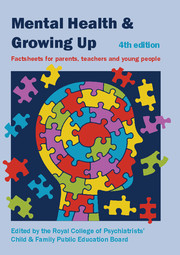Book contents
- Frontmatter
- Contents
- Contributors
- Factsheets for young people
- Factsheets for parents, carers and anyone who works with young people
- 1 Good parenting
- 2 The restless and excitable child
- 3 Dealing with tantrums
- 4 Children who soil or wet themselves
- 5 Sleep problems in childhood and adolescence
- 6 Behavioural problems and conduct disorder
- 7 Attention-deficit hyperactivity disorder (ADHD)
- 8 The child with general learning disability
- 9 Specific learning difficulties
- 10 Autism and Asperger syndrome
- 11 Depression in children
- 12 Worries and anxieties: helping children to cope
- 13 Divorce or separation of parents: the impact on children and adolescents
- 14 Death in the family: helping children to cope
- 15 The emotional cost of bullying
- 16 Traumatic stress in children
- 17 Domestic violence: its effects on children
- 18 Child abuse and neglect: the emotional effect
- 19 Drugs and alcohol: what parents need to know
- 20 Self-harm in young people
- 21 Psychosis
- 22 Schizophrenia
- 23 Bipolar disorder in children and adolescents
- 24 Obsessive–compulsive disorder in children and young people
- 25 Eating disorders in young people
- 26 Chronic physical illness: the effects on mental health
- 27 Medically unexplained physical symptoms
- 28 Chronic fatigue syndrome: helping your child get better
- 29 Parental mental illness: the problems for children
- 30 Who's who in CAMHS
12 - Worries and anxieties: helping children to cope
from Factsheets for parents, carers and anyone who works with young people
Published online by Cambridge University Press: 02 January 2018
- Frontmatter
- Contents
- Contributors
- Factsheets for young people
- Factsheets for parents, carers and anyone who works with young people
- 1 Good parenting
- 2 The restless and excitable child
- 3 Dealing with tantrums
- 4 Children who soil or wet themselves
- 5 Sleep problems in childhood and adolescence
- 6 Behavioural problems and conduct disorder
- 7 Attention-deficit hyperactivity disorder (ADHD)
- 8 The child with general learning disability
- 9 Specific learning difficulties
- 10 Autism and Asperger syndrome
- 11 Depression in children
- 12 Worries and anxieties: helping children to cope
- 13 Divorce or separation of parents: the impact on children and adolescents
- 14 Death in the family: helping children to cope
- 15 The emotional cost of bullying
- 16 Traumatic stress in children
- 17 Domestic violence: its effects on children
- 18 Child abuse and neglect: the emotional effect
- 19 Drugs and alcohol: what parents need to know
- 20 Self-harm in young people
- 21 Psychosis
- 22 Schizophrenia
- 23 Bipolar disorder in children and adolescents
- 24 Obsessive–compulsive disorder in children and young people
- 25 Eating disorders in young people
- 26 Chronic physical illness: the effects on mental health
- 27 Medically unexplained physical symptoms
- 28 Chronic fatigue syndrome: helping your child get better
- 29 Parental mental illness: the problems for children
- 30 Who's who in CAMHS
Summary
How common is anxiety in children?
Anxiety is one of the common mental health problems. Nearly 300 000 young people in Britain have an anxiety disorder. Lots of people, however, suffer in silence. It is important to recognise their problems and seek help, especially when it starts affecting their everyday life.
Growing up: different types of anxiety
Anxieties are grouped based on what the fear or worry is about. These groups are helpful in understanding what the difficulties are and how to treat them.
Fears and phobias
Young children often develop fears, for example of animals or of the dark. A phobia is an extreme fear which causes a lot of distress and affects the child's life significantly. For example, a fear of dogs is called a phobia if it means that a child refuses ever to go to the park to play.
Most children either grow out of their fears or learn to manage them with support and encouragement, but it is much more difficult to cope with a phobia without some extra help.
General anxiety
Some youngsters feel anxious most of the time for no apparent reason. It may be part of their temperament, or it may be part of a pattern of behaviour that is shared with other members of the family. If the anxiety becomes very severe, it can mean that the child will not want to go to school, cannot concentrate or learn, and is not confident with other people.
Separation anxiety
Worry about not being with a child's regular caregiver is a common experience for most children. It normally develops at 6 months, and can go on in some form during the pre-school years. It can make going to sleep, parents leaving for work, or settling at nursery or school very difficult at times. If it is extreme and affects the child's development, education and family life, it may be useful to get some additional help. stress disorder (PTSD) or obsessive–compulsive disorder (OCD). Unlike young people and adults, it is extremely rare for children to have panic attacks.
- Type
- Chapter
- Information
- Mental Health and Growing UpFactsheets for Parents, Teachers and Young People, pp. 80 - 83Publisher: Royal College of PsychiatristsPrint publication year: 2013



